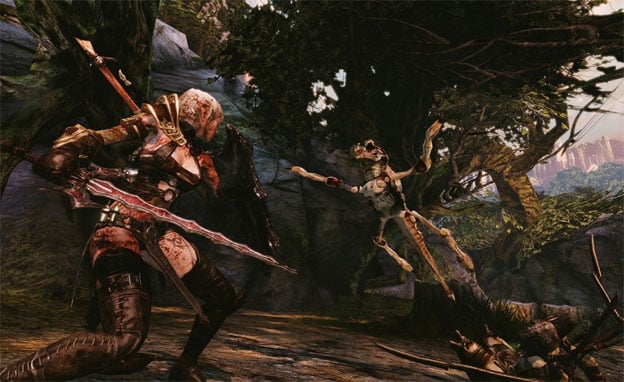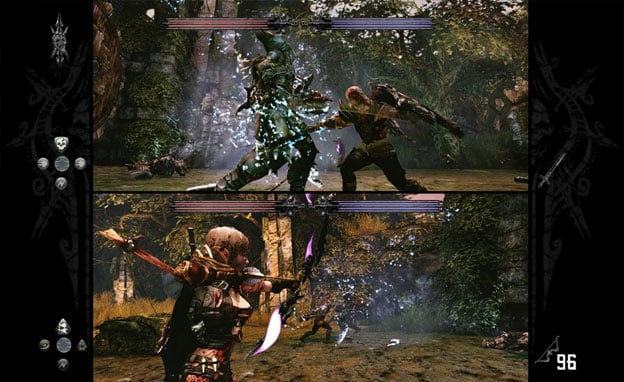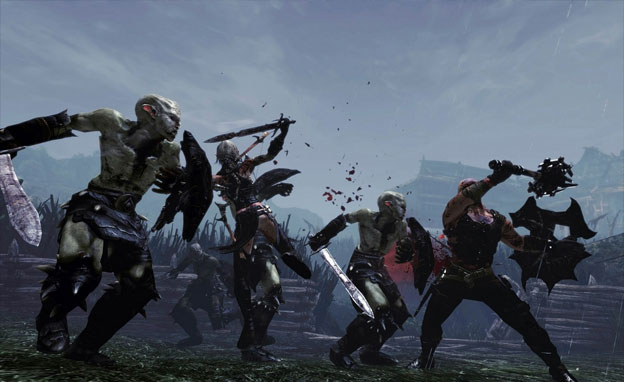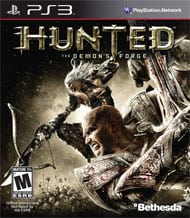New School Engine, Old School Game
Back in the days of the SNES and the PSOne, the Japanese RPG was the leader of the role-playing pack. While these JRPGs were crafting epic linear tales about time travel and killing god, we in the American RPG crowd were controlling faceless, nameless protagonists looking only to roam a few randomly-generated dungeons and make a quick buck while doing so. Now JRPGs are struggling, and ARPGs have taken the throne. But gone are those pleasant little dungeon crawls, replaced by post-apocalyptic adventures and sci-fi epics. Where are the Baldur’s Gates and Diablos of our youth? Well, in Dragon Age and Demon’s Souls, I suppose. But if you are bored with those games, you might also want to check out an upcoming title from inXile and Bethesda called Hunted: The Demon’s Forge.
Hunted is supposed to be a “re-imagining” of the classic dungeon-crawling games of our youth. According to Brian Fargo, the man behind the game at inXile Entertainment, the core experience of the dungeon crawl – that of getting lost in a dungeon on your quest for loot – had all but faded in our modern day gaming environment. Instead, gamers had become used to direct mission-based games like Gears of War. In Hunted, Fargo is trying to meld those two experiences together to make a brand-new type of gameplay. In an interview at E3 last year, he said he was trying to make gamers look at Hunted as “Gears of Warcraft.”

This design philosophy shows once you’ve seen the game’s core gameplay. Players will take control of a two-person team, each with the ability to revive the other should the chips go down. They are controlled from a third-person, over-the-shoulder perspective and will take advantage of an extensive cover system to stay safe. Both characters will mix up ranged and melee attacks while taking down their opponents, and they’ll work together to solve puzzles in order to progress further. Heck, you can even perform cinematic executions that pack as much punch as a chainsaw gun. In fact, if you looked at the game engine, you could swear it was Gears of War painted over with a fresh coat of Lord of the Rings.
The similarities to modern day gaming end there, and more traditional dungeon crawler mechanics take the reins. Instead of two space marine stereotypes, you will be controlling E’lara, an elfin huntress, and Caddoc, a buff warrior. (Actually, he wouldn’t look out of place in a space marine outfit.) E’lara uses quick weapons up close, but is far more deadly with a bow and arrow. Conversely, Caddoc wields heavy weapons that pack a massive punch up close, but he’s not quite as good at range. Many of the puzzles in the game revolve around these character differences. One example has Caddoc defending E’lara from rampaging beasts as she deftly snipes magical targets at a distance. Another has Caddoc draining a pool of water so E’lara can progress forward through a tiny opening that Caddoc can’t fit through.

As you progress through the game, you will gain currency in the form of crystals. Crystals can be used to increase your characters’ abilities, which range from latent power-ups to special spells. Spells can be used either independently or cooperatively. For example, Caddoc can use the levitate spell to cause him and E’lara to float, or he can use it to cause enemies to float instead so E’lara can safely pick them off as they flail in the air. E’lara can use her ice-arrow spell to pierce the enemy with needles of ice or to enchant Caddoc’s physical attacks with ice elemental damage. Many spells in the game have dual uses like this which can be unlocked by spending crystals. Spending crystals also makes your abilities more powerful and makes an A.I. teammate more likely to use them.
Other than crystals, you will also find weapons and armor strewn throughout dungeons. Weapons and armor will all have their own individually-generated stats, and E’lara and Caddoc can find progressively better items as the game goes on. Characters can equip a variety of different weapons, each with their own playstyles. Caddoc, for example, can equip swords, axes, and maces, each of which is used in a different way. Items will also have a durability stat that will lower with use, eventually causing the item to break. Caddoc’s shields were one example that was given during a live play demo last E3. They will lose durability every time they take a hit and will eventually shatter altogether.

The game is co-op only, but you can have the computer control your partner. Online play is where the real fun is, however, as you will be able to transfer any character advancement during a co-op session to your single-player campaign. After a co-op session, you can choose to either resume your single-player campaign from the point you last left it, or start from the point where you ended your co-op session. This allows you to play the game exactly how you want without needing to retrace your steps after an online session.
Online, the game will track the stats of both characters as they progress. So if you feel like playing a Legolas/Gimli game of “who can kill the most nasties,” Hunted has you covered. If you get sick of your character, you can switch to the other by meeting up at a change point. When you do this, character stats will also be changed, allowing you to play your Caddoc and your E’lara rather than anyone else’s.
The game will reward exploration as you progress through dungeons. Players will be able to follow an easy linear path from start to finish if they’d like, but if they stray off the path, enemies will get harder and the loot will get better. The guys at Bethesda said that players can spend an endless amount of time just wandering around and finding new loot if they go far enough away from the main path.
Unfortunately, we haven’t really seen much more info than this. But this is Bethesda we are talking about, and they certainly know their RPGs. If you are looking for old school gameplay with a new school twist, you’ll want to check out Hunted: The Demon’s Forge when it comes out late this May. At least it will hold you over until Skyrim.
Game Features:
